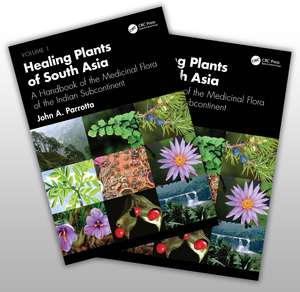Healing Plants of South Asia: A Handbook of the Medicinal Flora of the Indian Subcontinent. Two-volume set
Autor John A. Parrottaen Limba Engleză Hardback – 2 oct 2024
However, the ongoing transformation and degradation of forests and other natural ecosystems in this region due to rapid environmental and socioeconomic changes, poses serious challenges for the conservation and sustainable utilization of its medicinal plant wealth. Efforts to conserve the region’s rich biodiversity and associated traditional knowledge require up-to-date information on the status and trends of these resources and their importance for health care and livelihoods. Healing Plants of South Asia: A Handbook of the Medicinal Flora of the Indian Subcontinent helps to address this need.
The work’s introduction provides overviews of South Asia’s diverse systems of traditional medicine, as well as the region’s biogeography, ecosystem and plant species diversity and associated conservation challenges. Subsequent chapters focus on nearly 2,000 species of plants most commonly used in traditional medicine within the region. In chapters devoted to ferns and lycophytes (including 59 species), conifers (20 species) and flowering plants (1849 species), the information provided draws upon a wide variety of authoritative published sources as well as reliable online databases. Entries for each species include: currently accepted scientific names and common synonyms; vernacular names in the major regional languages; a complete botanical description; information on the species’ ecology and conservation status; traditional therapeutic uses in Ayurveda, Unani, Siddha, Tibetan medicine, and more localized folk medical systems; and key references. The majority of these species are also beautifully illustrated with photos and/or botanical drawings.
Healing Plants of South Asia: A Handbook of the Medicinal Flora of the Indian Subcontinent will be of value to students, scientists and professionals in a number of fields, including pharmacology, pharmaceutics, food chemistry and nutrition, natural products chemistry, ethnobotany and ethnomedicine. It should also appeal to conservationists, community development practitioners, industry, and policy makers, among a host of those involved in the world of medicinal plants and traditional medicine in South Asia.
Preț: 2693.68 lei
Preț vechi: 3589.87 lei
-25% Nou
Puncte Express: 4041
Preț estimativ în valută:
515.45€ • 540.63$ • 429.09£
515.45€ • 540.63$ • 429.09£
Carte tipărită la comandă
Livrare economică 01-15 aprilie
Preluare comenzi: 021 569.72.76
Specificații
ISBN-13: 9781032896151
ISBN-10: 1032896159
Pagini: 1956
Ilustrații: 3580
Dimensiuni: 210 x 280 mm
Greutate: 4.04 kg
Ediția:1
Editura: CRC Press
Colecția CRC Press
Locul publicării:Boca Raton, United States
ISBN-10: 1032896159
Pagini: 1956
Ilustrații: 3580
Dimensiuni: 210 x 280 mm
Greutate: 4.04 kg
Ediția:1
Editura: CRC Press
Colecția CRC Press
Locul publicării:Boca Raton, United States
Public țintă
Academic and Professional ReferenceNotă biografică
John Parrotta, Ph.D., is a forest scientist engaged in research for over 40 years, in Puerto Rico, Brazil, India and other countries worldwide. His areas of interest and expertise include tropical forest ecology, biodiversity conservation, ecology and management of planted forests, forest landscape restoration, forest history, and traditional forest-related knowledge. He is the author of nearly 200 scientific publications, including two books in the fields of traditional forest knowledge and medicinal plants, Healing Plants of Peninsular India (CABI: 2001), and Traditional Forest Knowledge: Sustaining Communities, Ecosystems and Biocultural Diversity (Springer: 2012).
He holds a B.A. in Biology and B.S. in Chemistry from Merrimack College (in Massachusetts, USA), an M.Sc. in Ecology from the University of Aberdeen (Scotland, UK), and a Ph.D. from Yale University. A career scientist and national research program leader for international science issues with the USDA Forest Service, his current work focuses on the conservation, restoration and sustainable management of forests worldwide. Dr. Parrotta also serves as the president (2019-2024) of the International Union of Forest Research Organizations (IUFRO) in which he has held many leadership positions since 1993, He also serves as an editorial board member for several scientific journals, including Restoration Ecology, Ecosystems and People, and Forest Ecology and Management.
He holds a B.A. in Biology and B.S. in Chemistry from Merrimack College (in Massachusetts, USA), an M.Sc. in Ecology from the University of Aberdeen (Scotland, UK), and a Ph.D. from Yale University. A career scientist and national research program leader for international science issues with the USDA Forest Service, his current work focuses on the conservation, restoration and sustainable management of forests worldwide. Dr. Parrotta also serves as the president (2019-2024) of the International Union of Forest Research Organizations (IUFRO) in which he has held many leadership positions since 1993, He also serves as an editorial board member for several scientific journals, including Restoration Ecology, Ecosystems and People, and Forest Ecology and Management.
Cuprins
Chapter 1. Introduction: Plant Wealth and Human Health in South Asia
Chapter 2. Pteridophytes (Ferns and Lycophytes)
Chapter 3. Gymnosperms (Conifers, Cycads, Ginkgo, and Gnetophytes)
Chapter 4. Angiosperms (Flowering Plants).
Common Name Indexes (in 31 languages).
Scientific Name Index.
Index of Medicinal Uses.
Chapter 2. Pteridophytes (Ferns and Lycophytes)
Chapter 3. Gymnosperms (Conifers, Cycads, Ginkgo, and Gnetophytes)
Chapter 4. Angiosperms (Flowering Plants).
Common Name Indexes (in 31 languages).
Scientific Name Index.
Index of Medicinal Uses.
Descriere
Healing Plants of South Asia provides an overview of its floristic biodiversity and the traditional plant-based healing practices associated with the region's rich cultural diversity.
